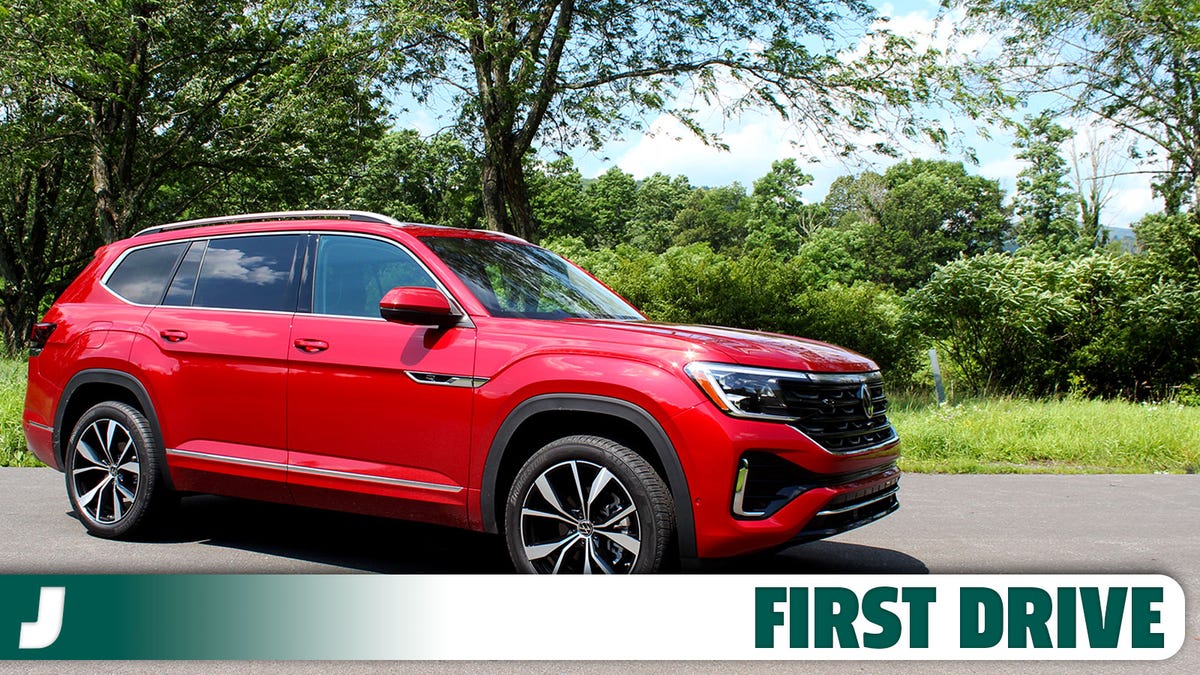You’re spoiled for choice if you’re in the market for an SUV in America. Heck, if you’re only in the market for a German SUV stateside, you’re pretty spoiled for choice. With such a saturated segment to choose from, what can Volkswagen do to make its Atlas and Cross Sport models stand out? For 2024, the answer appears to be to pack more features into entry-level options, neaten up the interior and offer a more powerful four-cylinder motor. Question is, has it worked?
Full Disclosure: Volkswagen invited myself and several other journalists to the Catskills in upstate New York, where we were put up in an Airstream for a night, fed and allowed to drive the Atlas and Cross Sport SUVs around the mountains for a day.
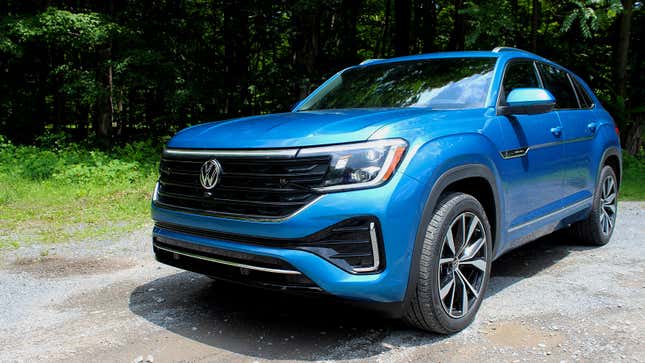
What Are The 2024 Atlas And Cross Sport?
Launched in 2017, the Volkswagen Atlas was a vehicle specifically developed for the American market. In its standard form, it’s a mid-size, three row SUV, while the Cross Sport loses a row of seats but gains a gaping trunk and a sportier-looking sloped roofline at the rear. However, these new iterations of both the Atlas and Cross Sport remain startlingly familiar looks-wise. VW did a little update to the front end, adding an LED light bar and giving the front an illuminated VW logo. The badge at the rear also lights up, but in red rather than the white you see on the nose.
Inside, there’s an updated interior that features some nice leatherette seats in most trims, and real leather if you opt for the top SEL and SEL Premium options. Both cars also have a new center console and more storage space inside the cabin. VW added wireless charging and up to eight USB plugs throughout for plugging everything in, including one in the rearview mirror to power a dash cam or radar detector.
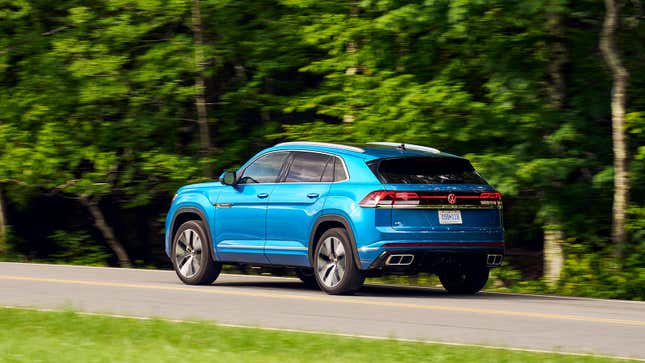
Driving The 2024 Atlas And Atlas Cross Sport
The big change over the outgoing model is the updated engine, which despite being the same turbocharged four-cylinder unit you’ll find in the Golf R or Arteon, is perfectly capable of lugging around this 4,000 pound SUV, as well as towing nearly 5,000 pounds. In the new models, it produces 34 more horsepower than its predecessor (at 269 hp) and is connected to an eight-speed automatic gearbox, providing the Atlas with ample control for slow-speed maneuvers. This power helps make the Atlas more than capable climbing up to highway speeds when you mash the gas. When you do mash it, there’s a slight bass-y rumble from the engine but VW has taken steps to quieten the cabin – such as refinements to the crankcase and sections of the oil pan to reduce noise.
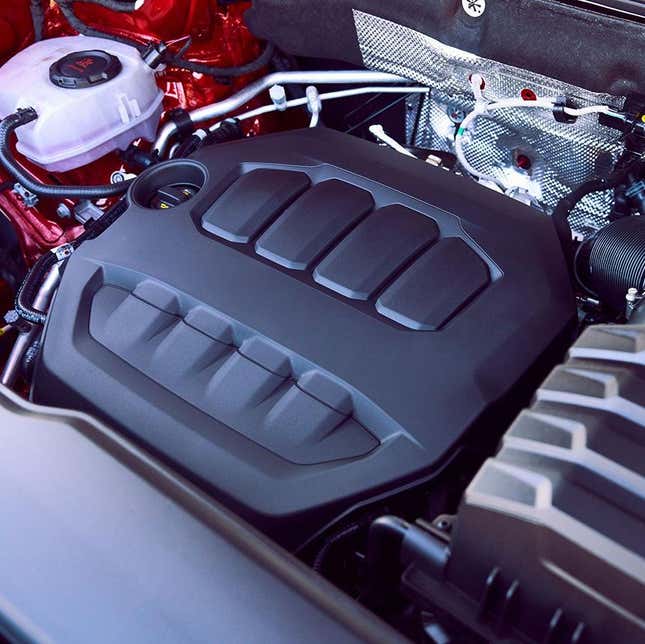
On the undulating roads you find around the Catskills, both the Atlas and the Cross Sport were perfectly capable, if a little unremarkable. The power was there when you needed it, but arrived on the scene with little fanfare, while the steering was super light and controlled without being aggressive or sloppy. What’s more, when you tackled a sharp bend, the car didn’t feel like it was rolling and lumbering around, like some larger SUVs can. Instead it stayed level and planted to ensure a smooth ride for everyone on board.
If you’re not satisfied with how the driving feels, you can tweak the way this car handles with the five driving modes that come equipped on the Atlas and Cross Sport, as well as a sixth Offroad setting available in all-wheel-drive models. I found that Comfort was the place I wanted to spend the most time as it kept the ride supple and the car steady. Then there’s Eco, to help achieve the car’s claimed 21 mpg fuel economy, along with Custom and Snow modes.
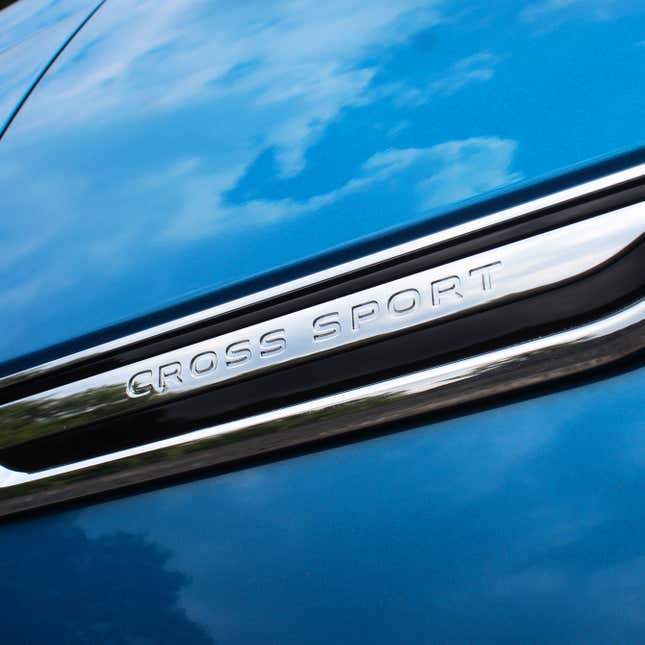
There’s also a Sport setting, which is meant to take the car’s performance up a notch by altering the way the engine, transmission, steering and adaptive cruise control work. While Sport did lend a slight increase in the car’s responsiveness, the biggest change you’ll spot is the engine note that’s piped through the cabin. It’s noticeable as soon as you switch into Sport mode, and while it’s not really offensive in any way, it’s about as enjoyable as the sound of someone vacuuming on the floor above.
The Offroad setting is an interesting proposition, because I can’t see too many Atlas owners hitting the trails any time soon. But if you do, this position turns off the start/stop system and gives you manual control via VW’s Tiptronic transmission. It also activates the car’s Hill Descent Control on gradients of more than 10 percent. To aid those descents, the Atlas has 13.2-inch vented discs at the front and 12.2-inch rotors at the back fitted on both vehicles. They bring you to a steady halt at lights and stop signs, but with the momentum this SUV carries at higher speeds, they could definitely stand to be a touch more powerful.
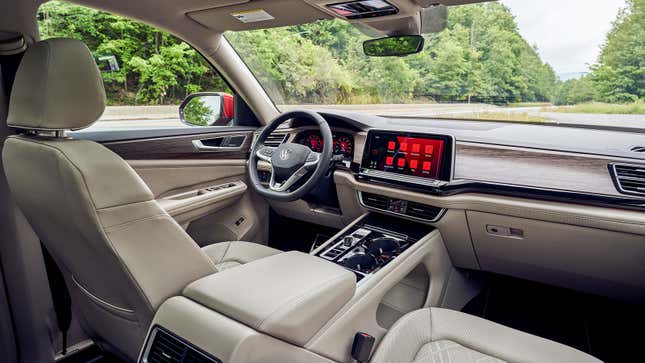
What’s Inside The 2024 Atlas And Cross Sport?
The most noticeable updates this year are all inside the Atlas and Cross Sport, which again, are startlingly similar inside. Overall, it’s a comfortable, feature-packed cabin with some smart new seats, but it does come with a few new car niggles.
New for 2024, both the Atlas and Cross Sport’s interior features a floating 12-inch display, which is standard across every trim level. The display unlocks all the car’s capabilities, including media setup and navigation, which in the Atlas is quite polite – saying “please” before each instruction. If you prefer your navigation a little sassier, wireless Apple CarPlay and Android Auto are also available.

Because everything is controlled through this screen, there is a distinct lack of physical buttons in both cars. Beneath the center screen, you’ll see sliders for the climate controls, as well as another for audio volume. But these aren’t tactile controls, and just feel like sliding a finger across polished glass.
Underneath, there are more capacitive buttons that access things like the full climate controls, the driving modes and the driver assist features. But once you tap these buttons, it’s back to the screen to finalize your selection. VW is clearly hoping that we’re now all on board with touchscreen everything.
The rest of the dash is finished in a selection of new materials, including mock woods like “Nord Mystery,” which was inside the R-Line Atlas I drove, and “Copper Fiber,” which is the carbon fiber alternative that flanked my R-Line Cross Sport and appears to hold up well against marks and fingerprints thanks to its flat finish.
As well as those new finishes in the cab, the 2024 models come with a sharp-looking perforated contrast pattern on both the leather and leatherette seats. In the Atlas, it’s a subtle gray while the Cross Sport comes with a lovely blue underlay. As well as looking sleek, the seats were pretty comfy for both a driver and passenger, with plenty of control to set the chair up to fit your body type. In every trim level, you now get heated and vented seats up front, and a heated second row is available in both the Atlas and Cross Sport on the mid-tier SEL spec and up.
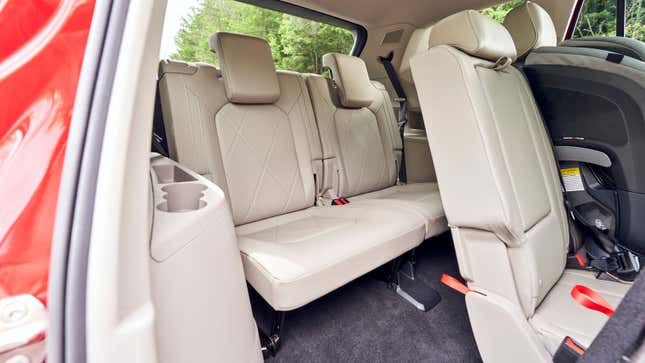
In that second row, you’ll find either two captain chairs or a bench, which is capable of fitting three child seats that can remain fixed while you flip it forward. If you go for the three-row Atlas, those rear seats can accommodate two adults, but legroom for my six-foot frame was snug back here.
Other than the leather finishes on the top-tier models, the majority of touchpoints in the Atlas are plastic, with VW not adopting any eco-minded materials across its interior. This is a shame, as the company offers materials made from recycled bottles in its EVs, so could surely have carried some of those reclaimed fabrics over here as well?
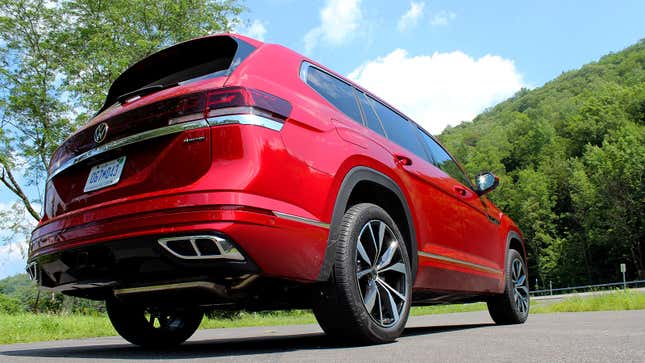
So, Which Should You Pick?
If you’ve reached this point and you’re not sure whether you’re more of an Atlas buyer or a Cross Sport buyer, you’ve got to ask yourself one simple question: Do you want to haul around more people or more stuff? Because outside their capacities for each, these cars are unbelievably similar.
Both are priced pretty closely, with just a $1,010 premium for the Atlas over the Cross Sport, which starts at $38,065 including destination fees. Both have the same upgrades across each trim level, which brings more practicality to the entry level options. This means that whichever you choose, you’ll still get LED lights, heated side mirrors, a heated steering wheel and all of VW’s intuitive ID Drive assistance features – like lane assist, adaptive cruise control and emergency assist – at the minimum.
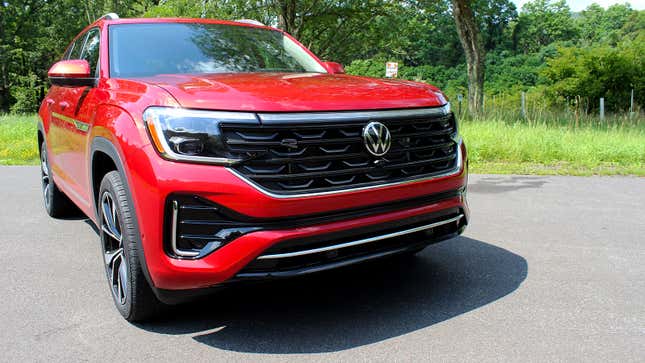
If I was given the chance to drive either of these cars home, however, I think I’d take the Cross Sport. Sure, you lose the practicalities of having an extra row of seats, but the car just looks that little bit smaller, despite being the same length and width. But with that slightly sloped roof line at the back, it has the edge looks-wise. Additionally, the trunk has a whopping 40.3 cubic feet of space compared to the 20.6 cubic feet you get in the Atlas. This means you’ve got ample room for the kind of outdoorsy gear that VW’s marketing department believes its owners take everywhere with them. But, whichever you choose, you really are getting a lot of vehicle for the money.
2024 Volkswagen Atlas 2.0T SEL Premium R-Line 4MOTION Specs
Engine type
Intercooled Turbo Premium Unleaded I-4
Transmission/Drive
Automatic w/OD

